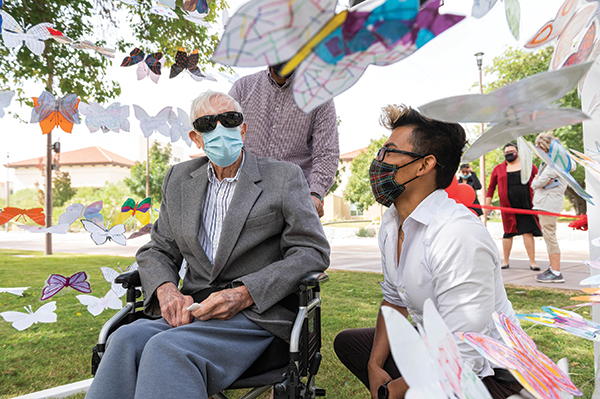On a grassy area west of Milton Hall, 300 special butterflies landed to honor borderland farmworkers and two decades of NMSU’s College Assistance Migrant Program.
The installation, “Mariposas Campesinas: Love Letters to our Farmworkers,” stemmed from a project for the J. Paul Taylor Social Justice Symposium. The installation was on display to the public in fall 2021.
For 20 years, CAMP has served students who are the children of migrant and seasonal farmworkers or students who have been farmworkers. To help them transition to the college environment as freshmen, CAMP students receive a $1,500 scholarship, book stipends and meal allowances as well as peer mentoring and support.
NMSU CAMP was among eight programs in the nation awarded a five-year, $2.1 million grant in 2017 from the United States Education Agency’s Office of Migrant Education. The program’s funding will be up for renewal again in 2022.
For the 2020-2021 freshmen cohort, NMSU CAMP students had a 93% retention rate after their first year at NMSU, and 70% of NMSU CAMP bachelor’s graduates stayed in the New Mexico workforce.
“Justice for Farmworkers” was the theme for the J. Paul Taylor Social Justice Symposium in 2020. Although the symposium was postponed due to COVID-19 restrictions and hosted virtually in 2021, plans for the art installation continued.
A collage of Monarch butterfly cutouts decorated with art by middle-schoolers at the J. Paul Taylor Academy, and with personal messages written by the students to farmworkers, would have been exhibited at the New Mexico Farm & Ranch Museum, then delivered individually to farmworkers in the borderland. The pandemic cancelled those plans.
Instead, the work was displayed in front of the CAMP offices at Milton Hall. More than 300 butterfly pieces were contributed and collected by Las Cruces-based artist Jesús Del Río, a first-generation immigrant, former farmworker, CAMP alumnus and NMSU art major.
The butterflies included submissions from schools around the region, and from as far away as the Philippines, thanks to Cynthia Bartow, CAMP’s administrative assistant, who was raised there.
“Growing up in a third-world country, I have seen poverty and lack of opportunity to grow and be successful in life firsthand,” Bartow says. “My parents worked hard for all of us to go to a university and to graduate with a degree, so we can have a better life. But even if you have a degree, there’s just not enough jobs for everyone. I learned to work tirelessly day and night and take every opportunity for work, regardless if I have to travel far from home.”
Bartow started working with CAMP in January 2021. She originally moved to Las Cruces from the Philippines in 2016 and says she can relate to the challenges that farmworker families face.
“They try to get every opportunity they can and would take any farm job regardless of how far and hard it is. If they need to be far from their family or under the scorching sun, they still do it,” Bartow says. “Working with CAMP gave me the opportunity to help kids going through the same hardships of missing their family, being alone in a totally different environment.”
For Del Río, the opportunity to build the structure gives him the chance to channel his identity as both the son of a migrant worker and a queer Latino artist.
“I started working in agriculture when I was 16,” he says. “This project is about paying homage to farmworkers, and I’m able to do that because of my background.”
The decorated butterfly cutouts used in the installation have a symbolic meaning.
“A lot of immigrant rights activists use the butterfly to symbolize the natural flow of migration,” says Ricardo Trejo, CAMP recruitment and outreach coordinator. “But just as butterflies are important to the environment, migrant farmworkers are important to our community and economy.”
After the installation ended, CAMP students and staff delivered the butterfly messages to farmworkers.


1220 Stewart Street
O'Donnell Hall, Suite 301
Las Cruces, NM 88003